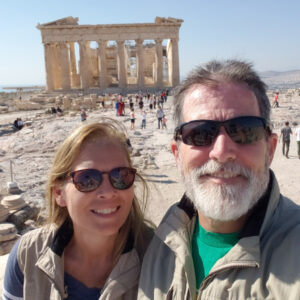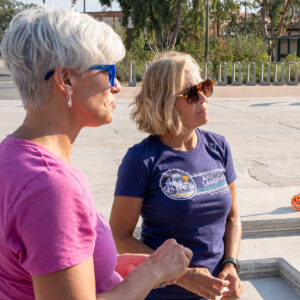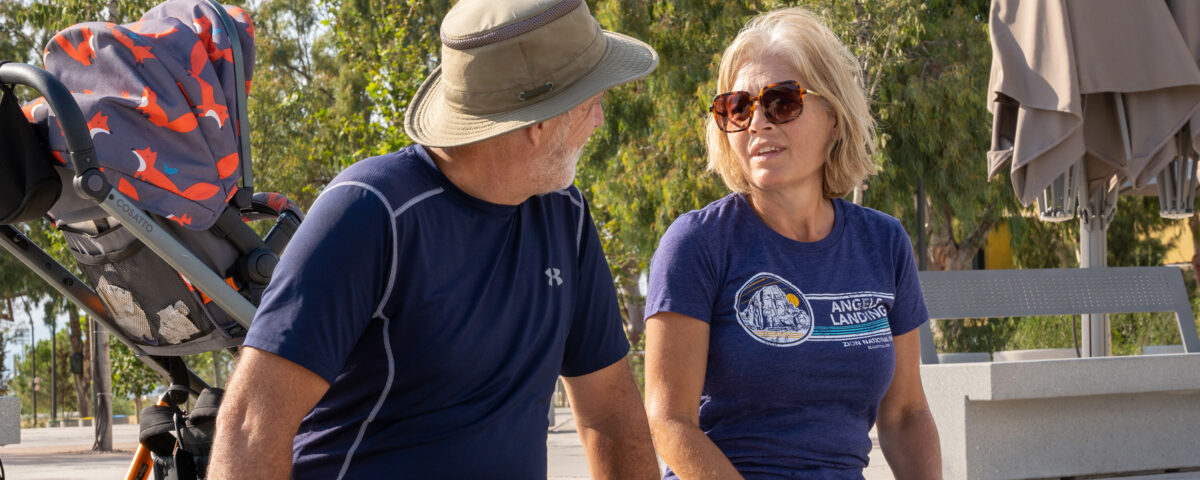Kevin and Barb Kelley have spent a lifetime serving people in crisis, him as a prison chaplain and her as a nurse practitioner. Following retirement, they sensed God placing a new passion in their hearts: refugee care and ministry.
The Lord led them to Athens, Greece, where they spent three months at the beginning of this year working with Helping Hands, an organization that meets practical needs and provides community support for refugee families amid massive transition. Kevin and Barb plan to return to Athens this fall to continue this work.
We connected with them to talk about their passion for refugees, what they’ve learned so far through their time in Greece, and how God is working in Athens.

Kevin and Barb Kelley in Athens, Greece.
What first prompted you to consider working with refugees?
We’ve had a heart for ministry to people in crisis for a long time, but the plight of refugees came to the forefront as we learned about the refugee crisis at the southern border of the U.S. circa 2015. We grew concerned about the conflation of religion and politics and were horrified to see how refugee populations were vilified. It became apparent that an effective response to our growing concerns was to make ourselves available to ministry with this vulnerable people group.
Our ongoing conversations with BIC U.S. World Missions as part of the Missionary Development Program led to an exploratory trip to the refugee camp on the island of Lesbos, Greece, in 2019. In 2022, after COVID-related delays, we returned to work in Athens with refugees further along their journey in search of asylum. That process of seeking discernment led us to partner with Helping Hands in Athens, a group that works with refugees, mostly from Afghanistan and Iran.
What does a week of ministry with Helping Hands look like?
It typically involves team building meetings and planning on Mondays. Tuesdays are focused on specialized group ministry (skills instruction, language learning, etc.) and a visit to refugee camps outside of Athens. Wednesdays are focused on women’s ministry, and Thursdays’ ministries are focused on men. Each Friday the Athens Refugee Center (ARC) is opened for a community meal followed by a lesson based in Scripture for those interested in staying to participate. Weekends are usually times for team members to practice Sabbath rest.

Kevin plays backgammon on a men’s ministry day with a man who is a refugee from the Middle East.
Can you describe a typical refugee journey to Greece?
Desperate needs call for desperate measures, and there are almost as many unique stories as there are refugees. Many refugees enter Greece via makeshift boats from the nearby border of Turkey, often on the island of Lesbos (the easternmost entry into the European Union). Others pay coyotes to smuggle them across the border, and still others walk miles through forests and other terrain to get to Greece. A common thread however seems that most involve danger and considerable risk. These journeys are seldom taken without great cost to those traveling.
Also, it is sobering to consider that those who successfully make it to Athens are those who have significant resources to get there. The most desperate often lack the resources to fund such a journey.
In your engagement with refugees, what is something surprising that you’ve learned?
Though not necessarily surprising, it is clear that much of the messaging in the U.S. about refugees is seldom an accurate reflection of reality. The vast majority of refugees are kindhearted, intelligent, gifted, and hardworking people who found themselves in the unfortunate position of being born in an unstable or unsafe location. The cliché “there but for the grace of God” could easily be played on a loop while working with this population.
We have much to learn from refugees, and assuming that we have solutions to their problems betrays an arrogance that is often unhelpful. This type of ministry needs to be very flexible. Refugees themselves need to define the need, and it’s the role of organizations like Helping Hands to respond to those needs as they develop and change.

Barb (right) and Vicky Landis (left, BIC U.S. World Missions) talk with Helping Hands staff members during a family ministry day at a park in Athens in 2022.
How did your first three months in Greece challenge you?
There is no shortage of sad stories, and the wish that we could do more is persistent. The hardest part of this type of ministry for us is the reality that while we can listen to and sympathize with the plights of individuals, we are often not in a position to do what is being asked. Certainly, we know that God can do above and beyond what we can, but the feeling of inadequacy has been a reality that we have had to manage.
What is a joy you’ve experienced while working with refugees?
What a blessing it has been to be part of a ministry team comprised of people from all over the world, bonded together by a common commitment to Christian ministry. Developing relationships with refugees, even in the midst of language barriers, has been a profound joy for us. We feel so fortunate to be invited into friendships with people from all over the globe who – regardless of their personal history – are souls loved by God. Each day is a reminder that God is good!
The problems refugees face can feel very daunting. What would you say to someone who wants to help but doesn’t know how to start?
Do something. None of us are equipped to do everything, and even when it feels like our efforts are less impactful than a rain drop in the ocean, God’s arithmetic marvelously – and often mysteriously – increases the impact of that droplet. God is up to something, and it is one of life’s greatest joy to be part of it.
You can keep up with Kevin and Barb and their ministry on their blog, kelleykrossings.com.


